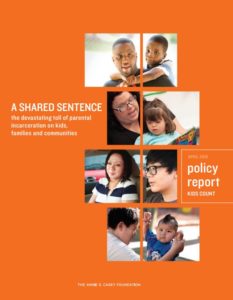When a mom or dad is sentenced to time behind bars, the intent is to punish that person for criminal behavior, and, hopefully, to deter them from future crimes. What is too often forgotten is that while they might go to prison alone, incarcerated parents aren’t the only ones that pay the price for their past behavior. Any punishment they receive extends beyond the prison walls to affect others who are guilty of nothing but being related to them.
The Annie E. Casey Foundation has released a new policy report that examines the impact of incarceration on the children of prisoners. In it, the authors identify the far-reaching impact that imprisonment has on families and communities, and proposes a path that might mitigate some of the damage occurring, while opening doors for strengthening families after release.
“Incarceration breaks up families, the building blocks of our communities and nation,” the report says. “It creates an unstable environment for kids that can have lasting effects on their development and well-being. … And different obstacles emerge once parents are released and try to assume their roles as caregivers, employees, and neighbors.”
The report offers three main recommendations for developing policies that keep the best interests of the children of incarcerated parents in mind:
- Supporting children both during and after their parents’ incarceration. Preserving the relationship between parent and child has a positive impact on both parties. To maintain that connection, the report recommends that judges, prosecutors, and other policy makers keep the family in mind when sentencing and assigning parents to prison; that programming be offered to children as a means to support mental and emotional well-being; that moms and dads be provided with counselling and parenting classes, both during and after incarceration; and that family access to legal, financial, health, and child care assistance be provided.
- Provide returning parents with help in finding employment. This can be accomplished by offering education and job-skills training to incarcerated parents, and by taking steps to remove hurdles inherent in job licensing and application. The study concludes that any cost that might come with the increased in-prison programming would be offset four to five times by the reduction in recdivism that would result from it.
- Strengthen the communities where families affected by incarceration live. Increasing community-based programs can help to create a support network that will keep moms and dads accountable to their peers, and foster goodwill amongst neighbors. It promotes the establishment of safe and stable households. Getting local government, businesses, institutions to offer their support to the community in the form of entrepreneurial assistance and job-training classes can help to build strong neighborhoods where families can thrive.
“The confinement of a parent should not doom a child to a lifetime of closed doors,” the report concludes. “Our hopes and dreams for children of incarcerated parents should be no different from the limitless horizon we seek for all of our children. They too deserve a blank page in our nation’s great storybook—and the chance to shape their part of the tale as it continues to unfold for themselves, their future families and our whole country.”
Through our Angel Tree program, Prison Fellowship seeks to restore families torn apart by incarceration. By providing gifts to boys and girls at Christmastime on behalf of their incarcerated parent, opportunities to interact with other kids dealing with a parent behind bars at summer camp, or through ongoing mentorship by caring adults, Angel Tree helps to provide for the physical, emotional, and spiritual needs of the families of prisoners. To get your church involved in Angel Tree this Christmas, click here.
